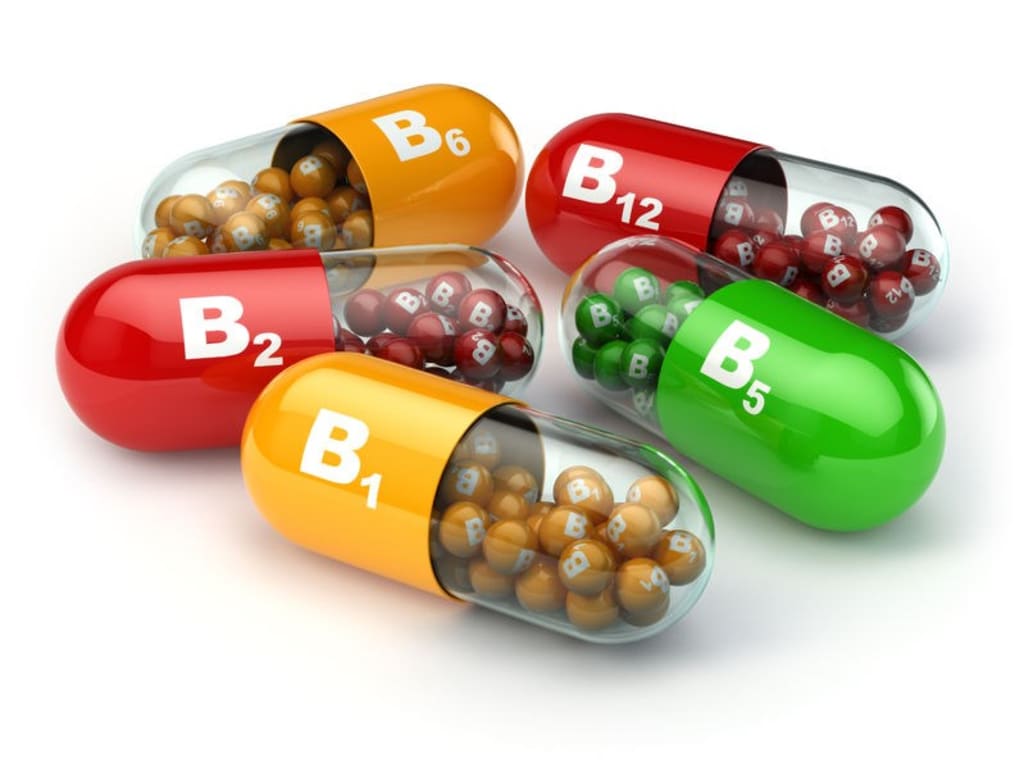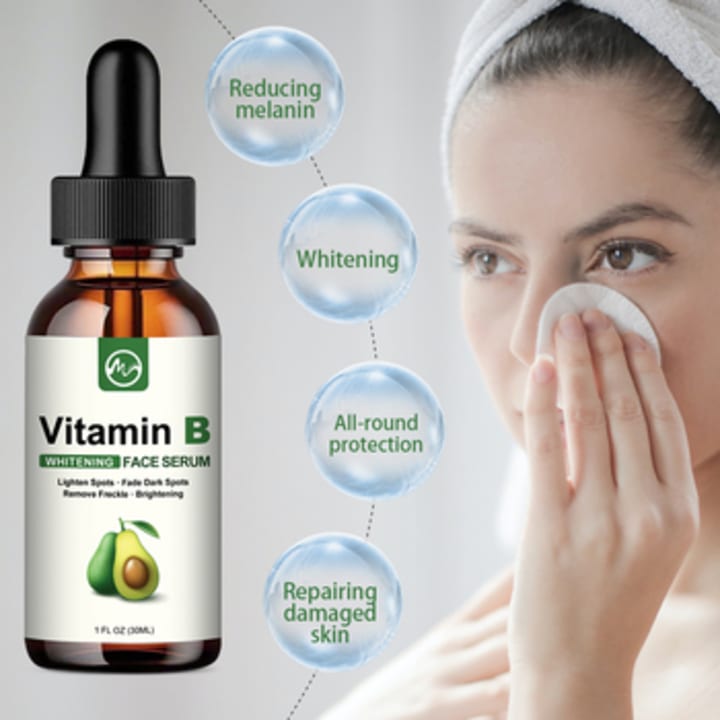What is vitamin B and what does it do? B vitamins for vegans
B vitamins

What is Vitamin B?
Vitamin B is a group of eight water-soluble vitamins that play important roles in maintaining good health. The eight B vitamins are:
B1 (thiamine)
B2 (riboflavin)
B3 (niacin)
B5 (pantothenic acid)
B6 (pyridoxine)
B7 (biotin)
B9 (folate)
B12 (cobalamin)
Each B vitamin has its own unique function, but they generally help the body convert food into energy, maintain healthy skin and eyes, and support a healthy nervous system. These vitamins are found in a variety of foods, including meat, poultry, fish, dairy products, and whole grains. A balanced and varied diet should provide enough of these vitamins for most people, but some people may need to take a supplement to ensure they get enough.
What foods contain vitamin B?
Vitamin B can be found in a variety of foods, including:
B1 (thiamine): pork, whole grains, fortified cereals, legumes
B2 (riboflavin): dairy products, almonds, mushrooms, dark leafy greens
B3 (niacin): poultry, fish, lean meats, nuts, legumes
B5 (pantothenic acid): avocados, sweet potatoes, mushrooms, eggs
B6 (pyridoxine): poultry, fish, potatoes, bananas
B7 (biotin): eggs, salmon, avocados, almonds
B9 (folate): leafy greens, legumes, oranges, fortified cereals
B12 (cobalamin): meat, poultry, fish, dairy products
It is important to note that some vitamins, such as B12, are not readily available in plant-based foods, so vegans and vegetarians may need to take a supplement or choose fortified foods to ensure they get enough of this essential nutrient. Additionally, cooking and processing can reduce the amount of B vitamins in foods, so eating a variety of raw and minimally processed foods can help ensure adequate intake.
Importance of vitamin b in facial care
Vitamin B is important in facial care for several reasons:

Nourishment: Vitamin B complex provides essential nutrients to the skin, helping to keep it healthy and radiant. B vitamins help to reduce signs of aging by improving skin hydration and elasticity.
Anti-inflammatory properties: B vitamins, especially B5 and B3, have anti-inflammatory properties that can help to reduce redness, swelling, and irritation. This can be particularly beneficial for people with sensitive or acne-prone skin.
Cell metabolism: Vitamin B helps to regulate the metabolic processes that take place in skin cells, promoting healthy cell growth and repair. This can help to reduce the appearance of fine lines, wrinkles, and age spots.
Protection from environmental damage: Vitamin B can help to protect the skin from damage caused by exposure to UV radiation, pollution, and other environmental stressors.
In general, incorporating Vitamin B into your facial care routine can help to improve the health and appearance of your skin. Some skincare products, such as serums, creams, and masks, contain Vitamin B, or B-complex vitamins, as an ingredient. It's important to choose products that are appropriate for your skin type and consult a dermatologist if you have any concerns.
What diseases does vitamin B deficiency cause?
Vitamin B deficiencies can cause a range of health problems, depending on which specific B vitamin is lacking. Some common deficiencies and their associated health problems include:
B1 (thiamine) deficiency: can lead to beriberi, a disease that causes symptoms such as fatigue, muscle weakness, and heart problems
B2 (riboflavin) deficiency: can lead to a condition called ariboflavinosis, which causes symptoms such as skin lesions, mouth sores, and sore throat
B3 (niacin) deficiency: can cause pellagra, a disease that causes symptoms such as diarrhea, skin problems, and confusion
B5 (pantothenic acid) deficiency: can cause symptoms such as fatigue, irritability, and numbness in the hands and feet
B6 (pyridoxine) deficiency: can cause symptoms such as anemia, skin problems, and depression
B7 (biotin) deficiency: can cause symptoms such as skin rashes, hair loss, and high cholesterol levels
B9 (folate) deficiency: can cause a form of anemia and can also increase the risk of birth defects in a developing fetus during pregnancy
B12 (cobalamin) deficiency: can cause symptoms such as fatigue, memory problems, and anemia
It is important to note that vitamin B deficiencies can be caused by a variety of factors, including a diet lacking in B vitamins, certain medical conditions, and certain medications. If you suspect you may be deficient in a particular B vitamin, it is important to consult a doctor or a registered dietitian for proper diagnosis and treatment.
What are the benefits of vitamin B?
The benefits of the B vitamins are many and diverse, as each of the eight B vitamins plays a unique role in maintaining good health. Some of the key benefits of the B vitamins include:
B1 (thiamine): helps convert carbohydrates into energy, supports a healthy nervous system
B2 (riboflavin): helps convert food into energy, maintains healthy skin and eyes
B3 (niacin): helps convert food into energy, supports a healthy nervous system and digestive system
B5 (pantothenic acid): helps convert food into energy, supports a healthy nervous system
B6 (pyridoxine): helps produce red blood cells, supports a healthy nervous system
B7 (biotin): helps convert food into energy, supports healthy skin and hair
B9 (folate): helps produce and maintain new cells, especially important during periods of rapid cell growth and division such as during pregnancy
B12 (cobalamin): helps produce red blood cells, supports a healthy nervous system
In addition to these specific benefits, adequate intake of B vitamins is also thought to support overall health and well-being, reduce the risk of certain chronic diseases, and promote healthy aging. However, it is important to get enough of these essential nutrients through a balanced diet or supplements, as a deficiency in any one of the B vitamins can lead to health problems.
What are the best ways for vegans to get their B Vitamins?
While animal products are a rich source of B vitamins, there are still many plant-based sources of these essential nutrients. Here are some ways for vegans to get their B vitamins:
B1 (thiamine): whole grains, legumes, fortified cereals, sunflower seeds
B2 (riboflavin): almonds, mushrooms, dark leafy greens, fortified plant-based milks
B3 (niacin): mushrooms, peanuts, brown rice, whole wheat bread
B5 (pantothenic acid): mushrooms, avocados, sweet potatoes, lentils
B6 (pyridoxine): potatoes, bananas, chickpeas, spinach
B7 (biotin): eggs (if eating a vegetarian diet that includes eggs), almonds, sweet potatoes, raspberries
B9 (folate): leafy greens, asparagus, lentils, fortified cereals
B12 (cobalamin): fortified plant-based milks, breakfast cereals, nutritional yeast, plant-based meat alternatives
It is important for vegans to pay special attention to their B12 intake, as this vitamin is not readily available in plant-based foods. Vegans should consider taking a B12 supplement or choosing fortified foods to ensure they get enough of this essential nutrient. Additionally, eating a varied and balanced diet that includes a wide range of whole and minimally processed plant-based foods can help ensure adequate intake of all the B vitamins
Whitening Body Serum Whitening Brightening Skin,AHA,Vitamin B,C 30ml Bleaching Dark Spot Serum
About the Creator
WORKING BRAIN
This is my hobby






Comments
There are no comments for this story
Be the first to respond and start the conversation.